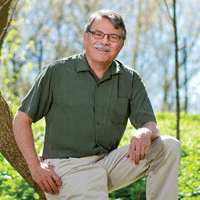The green movement isn’t just an idea to Bob Desautels — it’s the lifeblood that feeds his business. The president and group director of Guelph, Ont.’s Neighbourhood Group of Companies, Limited, which is comprised of two upscale-casual restaurants called Borealis Grille & Bar and The Woolwich Arrow Neighbour-hood Pub, plans to eventually run his operations with a zero carbon footprint. Here he tells F&H how he’s making a difference on his home turf.
F&H: You founded the Neighbourhood Group of Companies [NGC] with the purpose of creating a restaurant with the smallest environmental footprint possible. Can you talk about that?
Bob Desautels: I founded the group in the early 1990s, determined to follow a ‘buy-local’ philosophy. My commitment to regional initiatives and purchasing policy dates back to the late ’70s — even then I sincerely believed that buying from people in my own area would strengthen the local economy. Then, in 1983, I became a founding member of the Green Party of Canada and started to think in terms of sustainability as it pertains to restaurant operations. I thought buying local would help eliminate so-called ‘food miles’ and would lead to other benefits, like supporting the economy in a specific area. The move to reduce waste, and our carbon footprint, began
in 2000 with the goal of becoming the leader in the hospitality industry. One of our first moves was to compost some of our food waste. One of my business partners used it for his vegetable garden in the country.
F&H: What are your core green initiatives?
BD: Serving locally crafted food and beverages is our key modus operandi. Further initiatives include using green electricity [at one location], solar panels for hot water and organic cotton staff uniforms made in Toronto. We also ensure our spent fryer oil goes toward making biodiesel. I’ve even gone so far to mandate that any company-owned vehicles must be manufactured at Ontario assembly plants. Probably the most important green initiative, and the one I’m most proud of, is our fundraising activities relating to rivers in our communities. For 20 years we have been raising money for Guelph’s Speed River Project. This exciting venture involves naturalizing the river itself and planting native trees along its shores. Recently, we partnered with [the Cambridge, Ont.-based] Grand River Conservation Authority to raise money for restoring the Grand River. We also host a river dinner to raise funds for river restoration. Last year, [NGC] raised $12,000.
F&H: What are your most innovative green initiatives?
BD: Installing solar panels for hot water was one of our most cutting-edge initiatives, as I haven’t seen any other restaurant do this…. It’s nothing more than windshield washer fluid running through the panels, and it goes down into your basement [where] there’s a heat-exchange in a big water tank; the water takes up the heat and then that liquid goes back up into the panels. It supplies about 60 per cent of hot-water needs. And, every year, on Earth Day, we organize staff volunteers to clean up our local neighbourhood.
F&H: What are your cost savings and energy savings as quantified in dollar and metric amounts?
BD: In one of the restaurants that uses solar for hot water we saw a 10 per cent drop in electrical bills [since its hot water tanks were electric]. One of the most amazing impacts on our environment is the conversion to green electricity. We use Bullfrog Power. They told us that by using their wind-and-water generated power we are reducing our CO2 emissions by approximately 38 tons per year. There is also a significant drop in SO2 [sulphur dioxide] emissions. The other bonus of converting to green technologies is the impact it has on sales. When I converted power at my pub in Guelph in 2006 we were only doing $1.2 million in sales. By 2011, we were doing over $2 million, and I believe that has a lot to do with customers sharing our values. I’ve looked at a number of studies that support the view that many consumers want to spend their dollars at like-minded businesses. And, more sales means reduced costs, because, other than food costs and hourly wages, the majority of our expenses are fixed. As a percentage, these fixed costs have been reduced dramatically.
F&H: What are some of the key cost investments you’ve made to create a greener business?
BD: The cost of green electricity from Bullfrog Power is one good example. It comes with a $500/month premium. The solar panels cost approximately $11,000 each, and the cost recovery is estimated to be six-and-a-half years, but the panels have a 20-year lifespan.
At one of my locations, they had to build a new structure to hold the panels since they couldn’t be fitted to the roof of the heritage building. Thanks to the city bylaws, and engineering requirements, this structure cost me more than $10,000 extra.
F&H: How do you ensure a staff commitment to your green ethos?
BD: We try to reinforce our values through training and staff meetings. We also distribute bi-weekly newsletters, with our paycheques, which highlight new initiatives. A year ago we held a day-long seminar with all key personnel — it was moderated by Kathryn Cooper, a sustainability expert. She spent half the day explaining the impacts of our operational practices. It was a real eye-opener for a lot of us. Perhaps the best part of the day was an exercise Kathryn gave us whereby we calculated our personal footprint. Personally, I’m riding my bike more these days and seriously looking at carbon offset strategies to compensate for my travel on holidays.
F&H: How do you communicate your eco-friendly initiatives to the community and your customers?
BD: Customers see our solar panels, and we put up green eco stickers on windows. On our menu, we state our sustainability plan, which includes a picture of my granddaughter holding up a sign saying ‘There is no Planet B.’ We also encourage our staff to participate in our green philosophy and reduce their own carbon footprint. By telling their stories, it becomes part of our overall restaurant story.
F&H: You created an Eco-Challenge with Ontario’s University of Waterloo students in an effort to find new ways to reduce your company’s carbon footprint. Can you tell me about the outcome of that project?
BD: We worked with five students who helped us devise what we called the “Eco-Challenge Contest.” We sent information bulletins around to all restaurants and encouraged staff to come up with innovative ideas, too. In the end, we awarded three staff members with a cheque for $500 each for the best ideas. One great idea was to help suppliers use reusable containers versus cardboard boxes, another outlined ways of reducing our paper usage. They all looked at separating organic waste for farmer pick-ups. The students also provided us with a five-year plan to significantly reduce our carbon footprint and waste, and we’re going to hold a summit meeting of managers this fall to prioritize the recommendations, cost them out and look at implementing them.
F&H: The foodservice industry uses a lot of energy. What are some of your biggest challenges in creating a green-friendly company?
BD: Cooking equipment. Once you realize the amount of energy used in a commercial kitchen, it blows your mind. For example, a two-foot grill uses enough energy to heat a 2,000-sq.-ft. house. Also, water usage is outrageous. We’re looking at water-free urinals as one strategy to reduce water needs; we’re also experimenting with induction cooking.
F&H: What advice do you have for other foodservice companies hoping to create a smaller environmental footprint?
BD: Think globally, act locally. I hate to sound sanctimonious, but there are more important things than making money. Sorry, but at some point there has to be a paradigm shift in the way people think about living. You see many articles talking about the triple bottom line — the social, economic and environmental impact. This means every organization, including non-profits, should look at their bottom line differently. They should not only be measuring their economic results, but they should be taking into account the cost to the environment and the community. That should be the new business paradigm. I love the saying from Chief Seattle [a 19th-century American Indian Chief] “We do not inherit the Earth from our parents; we borrow it from our children.”
F&H: What’s your next green project?
BD: My wife, Sue, and I hope to travel across Canada over the next three years and write an e-zine entitled Locavores Digest. The goal of this publication will be to champion the best artisanal food and beverage producers. They’re our heroes. We hope to meet many of these amazing folks and chronicle their family history, their products and the ways to buy their products. We are mapping out our travel itinerary for 2014 and plan to do this journey in an electrical or hybrid car. Do you know a company that would donate one to us?





















